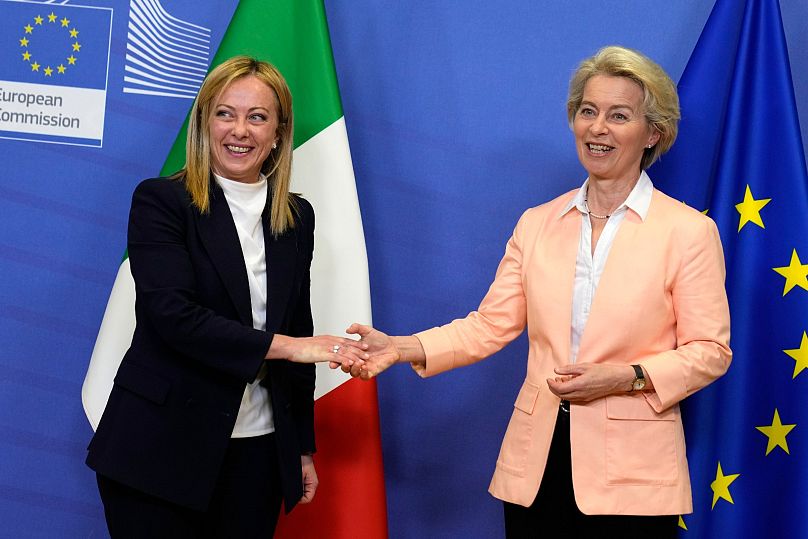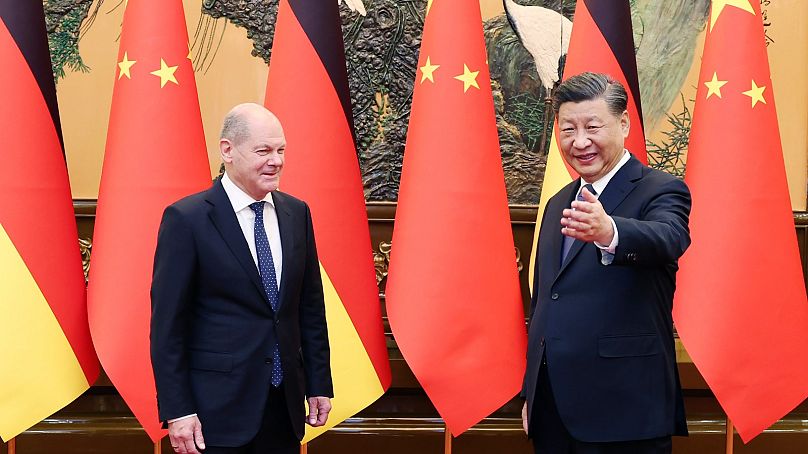Russia did a double U-turn this week on the grain deal agreed with Ukraine.
State of the Union is our weekly show that brings you the top stories from around Europe.
Russia's war in Ukraine has upended many diplomatic issues in Europe, one of them is the situation of the western Balkans, an area of longstanding conflicts and regional strife.
This week, a conference in Berlin brought together the leaders of six western Balkan countries that aspire to join the European Union.
In the German capital they signed a series of cooperation agreements designed to bring them closer to the EU.
Many of the six countries have complained a lot about being in the bloc's waiting room for years without a clear timeline for membership.
Now, they were told that the war in Ukraine has added a sense of urgency to the matter and that, as a consequence, they needed to get their act together and create real conditions for membership, as German Chancellor Olaf Scholz explained on Thursday.
"It is high time to overcome regional conflicts that have continued for far too long, conflicts that divide you and hold your countries back on your European path," Scholz said. "The normalisation process between Serbia and Kosovo in particular must speed up, so let's get it done."
Double U-turn on Ukraine grain deal
However, the Berlin conference was overshadowed by another diplomatic issue.
First, following a drone attack on Russian naval forces in Crimea, Russia crippled the grain corridor allowing vital shipments of grain and oilseeds to pass safely through the Black Sea to reach global markets.
For two days, the world feared an escalation of the global food crisis that would hit some of the poorest countries the hardest.
But then, after the successful mediation efforts of Turkey, Moscow made a U-turn.
"Information has been received from the Turkish side that such assurances have been given by Ukraine - not using these humanitarian corridors for military purposes," Russian President Vladimir Putin said.
"In connection with this, I have given instructions to the Ministry of Defence to resume our full participation in this work."
The Kremlin's sharp reversal underscored the uncertainty that has shrouded the fragile grain agreement ever since it was implemented because Putin also said that Russia reserved the right to withdraw from the agreement if guarantees were violated by Ukraine.
Meloni heads to Brussels
On Thursday, Italy's new far-right Prime Minister Giorgia Meloni made the short trip north to the Belgian capital where she met with all three of the EU institutions' leaders.
She welcomed a "very frank, very positive" exchangewith them after making a series of comparatively soothing remarks about the bloc since her election.
"I am happy with the climate I found in Brussels," the 45-year-old told reporters after meeting European Commission President Ursula von der Leyen, European Parliament President Roberta Metsola and European Council President Charles Michel.
"From a personal, human point of view, there was a very frank and positive exchange," added the leader, who heads Italy's most right-wing government since the post-war period.
Meloni travelled to Brussels for her first meetings with EU leaders since taking office.
The head of the eurozone's third-largest economy was determined to focus on the sensitive issue of soaring energy prices against the backdrop of Russia's war in Ukraine. The debate had already been started by her predecessor Mario Draghi, who had called for a solution from the EU27 and criticised Berlin's individualistic approach.
Meloni said she had "set out the Italian point of view" and insisted on the need to "find a European solution as soon as possible", defending the idea of a ceiling on gas prices.
Afterwards she said on Twitter that she wanted to send a sign that Italy "wants to participate, collaborate and defend its national interest within the European dimension, bringing the best solutions together with other nations on the great challenges".
Ursula von der Leyen struck the same conciliatory tone, referring in a tweet to the "strong signal" sent by this visit. "It was a good opportunity to exchange views on crucial issues," she added, referring in particular to Ukraine, energy and the issue of migrants.
Scholz meet Xi
German Chancellor Olaf Scholz also made a trip abroad, but this one was further in distance and much more contentious compared to Meloni's.
He is the first Western leader to visit the Asian country since the COVID-19 pandemic began, heading there with a delegation of German business leaders.
Many questioned the intentions behind his trip, arguing Scholz is prioritising economic ties at a time when the EU is looking to reduce its dependency on countries like China and Russia.
Following Friday's meeting, Chinese President Xi Jinping said there is an increasing need for cooperation between Beijing and Berlin amid "times of change and turmoil".
Xi added that as large nations with influence, the two should work together for the sake of world peace, according to state broadcaster CCTV.
"At present, the international situation is complex and volatile," Xi was quoted as saying.
"As large and influential countries, in times of change and turmoil China and Germany should work together all the more, to make more contributions to world peace and development."
Scholz told Xi that it was good both leaders were meeting in person during tense times and said Russia's invasion of Ukraine was creating problems for the rules-based global order.
He also said that the two would discuss issues related to Europe-China relations, the fight against climate change and global hunger, and how to develop China-Germany economic ties, as well as topics where both countries had different perspectives.












